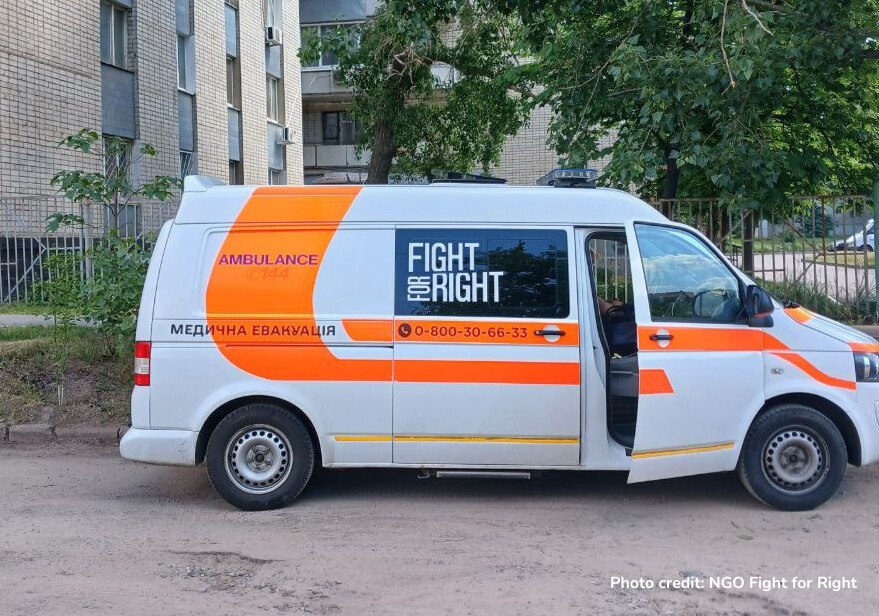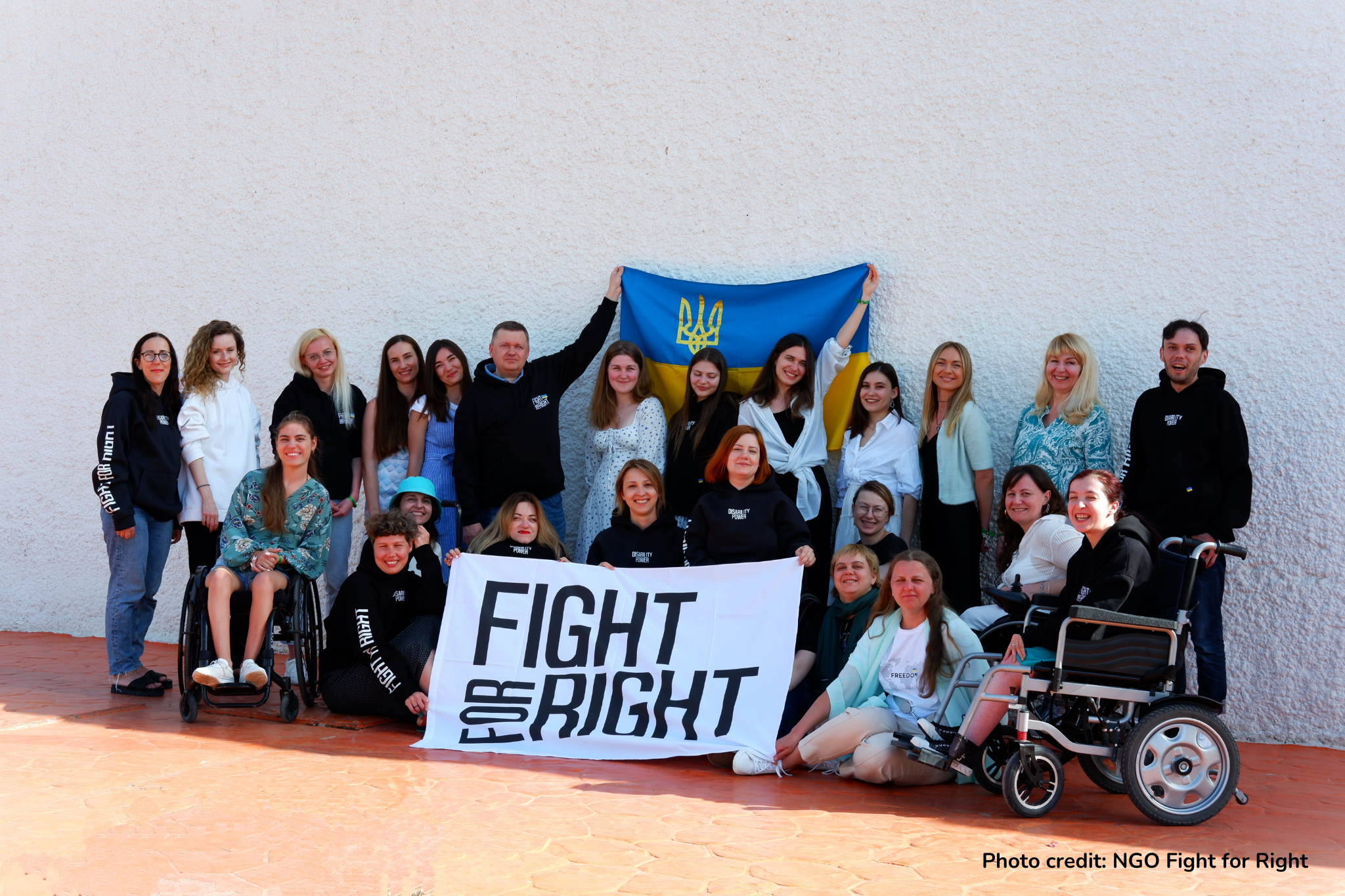Supporting People With Disabilities During the Invasion
Fight for Right is an organization dedicated to supporting and campaigning for the rights of people with disabilities in Ukraine. However, with the onset of the full-scale Russian invasion, it found itself fighting literally for the lives of these individuals—managing evacuation, humanitarian aid, and medical support. We spoke with its director, Tetiana Herasymova, about adapting to these new challenges.
What were the main areas of focus for Fight for Right before the full-scale invasion?
The project was founded in 2017 with the mission to break down stereotypes about people with disabilities. We placed a strong emphasis on what we called “active activities”. Thanks to our efforts, people with disabilities had the opportunity to participate in activities such as skydiving, scuba diving, and quad biking, instead of remaining confined to their homes.
We were also involved in cultural initiatives. For example, we produced tactile albums featuring cultural landmarks for individuals with visual impairments, enabling them to experience and appreciate cultural heritage.
A major area of our work was advocating the rights of people with disabilities. In 2020, we launched a significant campaign aimed at making elections accessible for them. We worked to ensure that polling stations were inclusive, and we succeeded in changing the rules to allow visually impaired individuals to select their own voting assistants.
In addition, we established the Disability Rights Center, where we conducted research on disability rights and engaged in active advocacy. A few months before the full-scale invasion, we organized Ukraine’s first conference for people with disabilities, where they themselves articulated their demands to the government, rather than having someone speak on their behalf.
As far as I know, you were somehow preparing for the war. Can you tell us what exactly you did?
We were not fully prepared for the scale of the invasion, but we anticipated potential conflicts in certain regions, so we made some preparations. Our organization’s head, Yulia Sachuk, began researching evacuation procedures and available instructions for people with disabilities. We started meeting with organizations working in the Donbas region, and everyone told us that there was no transportation or other means for evacuation. In other words, even evacuating people without disabilities was a challenge, let alone people with special needs.
As someone who uses a wheelchair, I realized that no one would be coming to evacuate me if needed. There was even a lack of information on how to prepare emergency bags for people with disabilities, which require more items than standard ones. Consequently, we first developed an action plan for our team.

We also set up a hotline for psychological support, as anxiety levels were high even before the invasion. We brought in a psychologist to work on the hotline, initially as a volunteer. To our surprise, the hotline soon began receiving evacuation requests as the invasion started. Our psychologist, who ended up in the occupied Zaporizhzhia region, managed these requests despite the challenging circumstances.
During these tough times, out of the ten people on our team, only one was outside Ukraine. She coordinated everyone at the beginning while the others were in the process of evacuating themselves. Later, we all became involved in the work and connected with many international organizations.
How did you organize the evacuations?
In the beginning, we were unfamiliar with case management, but everyone quickly became involved in it. We made numerous phone calls, arranged transportation, and coordinated with other organizations. I recall finding a driver who was willing to evacuate people from Bucha and Irpin when it was still feasible. With his help, we managed to evacuate two visually impaired individuals from those areas.
We did not have formal procedures in place, so we entered all data into Excel spreadsheets. Despite this being a new and overwhelming experience, it felt like the most important work we had ever done.
Eventually, we received assistance from The Partnership for Inclusive Disaster Strategies, an organization experienced in disaster management and case management. They helped us streamline our operations, set up a secure database, and allocate responsibilities more effectively.
We continue to receive evacuation requests, although most people who wanted to leave have already done so. Many other civil society organizations have established evacuation processes, so we refer requests to them when appropriate. Our current focus has shifted towards assisting communities struggling to access medical care. We help by bringing doctors to these areas and addressing other issues such as assisting those who lack internet access with finding information and completing financial aid applications.
However, sometimes we still handle evacuation cases. We even have medical transport now—in the beginning, this was a significant issue, as one evacuation in a private ambulance could cost several thousand dollars. Thanks to our partners, we now have our own vehicles, which are used either for medical missions or evacuations, wherever they are needed most.
What support do you provide to people after evacuation?
We assess each individual’s specific needs, such as replacing hearing aids or broken wheelchairs, or providing oxygen concentrators. During the winter, we distributed warm kits, purchased firewood, and installed windows as needed. Currently, we receive numerous requests for power banks and generators. For some the lack of electricity affects their ability to use air conditioners, while for others it is a matter of life and death as it impacts their oxygen concentrators.
We also offer legal assistance through our hotline. A lawyer provides help with document processing and legal consultations. Additionally, we provide psychological support through the hotline and in-person sessions in Dnipro and Odessa.
What is the current level of requests?
The number of requests fluctuates based on the situation in the country. During relatively calm periods, our hotline receives around 50 calls per week, but this can spike to 100 calls per day during more intense times. Overall, since the start of the invasion, we have managed more than 20,000 cases.
Do you work with veterans who have acquired disabilities?
We do not make a distinction between military and civilian disabilities. We are open to collaborating with veteran organizations and have already held several meetings with them, including with women veteran groups. Our annual human rights conference last year focused on veterans. We discussed with them how postwar reconstruction should include their perspectives and needs.
What is Fight for Right’s role in postwar reconstruction?
We are actively involved in discussions on this issue. We took part in last year’s Ukraine Recovery Conference in London and this year’s conference in Berlin. We constantly advocate for inclusive rebuilding, emphasizing that the institutional care system must be reformed completely. We are working with the Ministry of Social Policy and other partners to address these issues.
We are also raising these concerns at the international level with representatives of the European Parliament. Our key message is that people with disabilities must be directly involved in the reconstruction process. We want to ensure that we are included in all stages of planning and decision-making, rather than being left out to only observe the final outcomes.

What are the current challenges and priorities for the Fight for Right?
The primary challenge remains the ongoing military actions in the country, which require us to be adaptable and responsive. Over the past two years, our team has expanded threefold, now comprising over 30 people. Despite this growth, we still find ourselves in need of more personnel. We continue to collaborate with local organizations, even providing subgrants to strengthen our movement.
A significant migration of personnel is taking place, with some moving abroad for better opportunities or due to the loss of their homes. Nevertheless, we maintain connections with experts outside Ukraine and actively collaborate with them, while focusing on developing expertise within the country. For instance, we have a leadership school for girls and women with disabilities, which aims to support their personal and professional development. We also work with female war veterans and offer mentorship programs for teenage girls, offering guidance over a two-year period. Nurturing these future female leaders is crucial for rebuilding Ukraine.